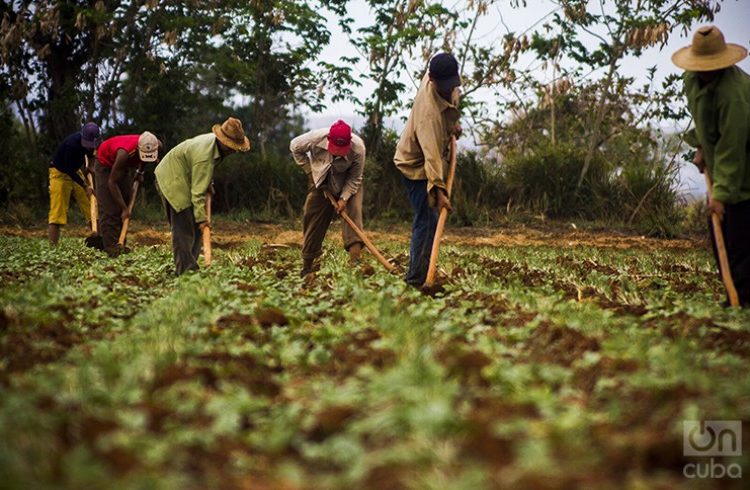Fifty-seven percent of the food produced in Cuba is lost before it reaches consumers. This was affirmed by a report by Mundubat, a development aid NGO based in the Basque Country linked to Cuban institutions. The harvest and post-harvest losses are estimated at around 30 percent of the total food production and the losses during the stage of food distribution to local rural and urban markets reach 27 percent.
The assessment, made together with Veterinarians Without Borders (VSF) as part of a cooperation agreement with Cuba financed by the Spanish International Cooperation Agency for Development (AECID), sets the losses in the harvest and post-harvest stage at 30 percent and the distribution to local rural and urban markets at 27 percent.
The report also points out that “Cuba is among the countries with an agriculture having the lowest yields in Latin America” and notes that although “the cooperative sector already has 80 percent of the land and produces more than 90 percent of the country’s food,” this production “only covers 20 percent of the population’s needs.”
The assessment emphasizes three big problems detected in the Mundubat and VSF diagnosis: weakness of the cooperative institutional structure, low productive yields and not sufficiently meeting the population’s demand for food.
Among the specific detected difficulties they mention “the lack of production planning instruments and a not very integrated management of each one of the phases of the agriculture and food chain in which the cooperatives are involved” and the vulnerability of the production systems in terms of climate change.
In addition, they point out the inheritance of “Intensive production systems that have been reoriented little by little toward sustainability in the last two decades but which have left important problems in the agricultural ecosystem,” as well as the degradation and salinity of the soils, the “excessive pasturing in certain areas,” the “high incidence of plagues and blights” and “a bad energy management of agricultural and cattle ranching farms.”
The report also speaks of “the obsolete equipment, the scarce investment in appropriate and clean technology, the limited access to adequate productive inputs” as factors that “still limit a higher production.” And it notes problems like “the deficient processing in the initial stages of harvests,” “the existence of means of transportation in a very bad state” and “the deteriorated storage systems,” which contribute to “the low quality in the final products supplied for consumption.”
Regarding the dissatisfaction of the domestic demands, the assessment recognizes “the low and unstable availability of food products throughout the year and fluctuating high prices due to the instability of supply,” and notes that “the policy of quality-price established by the government is not complied with, despite the strategies to adjust prices according to quality, the return of products, or their incorporation to the processing microindustries.”
In relation to women’s situation, “a low presence of women in leadership posts and structures is observed.”
Although Mundubat and VSF note that “the competent authorities in the sector have defined a series of measures that are being carried out for the implementation of the new economic and social model,” their report specifies that, until the moment of its publication (May 2017), the yields “are at a standstill or have slightly decreased.”
“We have a great deficit in agricultural production and not just because we have to import a lot but because what we produce we produce with low yields.” Photo: Raquel Pérez.
In the opinion of their experts “the different links and related services of the value chain function autonomously and not in an integrated way,” which generates “serious dysfunctions that prevent an active participation of the productive and farmer sector.”
They also warn that “to the extent that the agricultural sector does not increase its yields and exploits its productive potential, the economy will have to assume important expenditures to be able to supplement its domestic demand.” This is translated into an increase of food imports, “placing the economy in an increasing more vulnerable situation from the point of view of guaranteeing food security for families.”
Mundubat and VSF have been collaborating with Cuba since the 1990s in lines like food sovereignty and gender equality, and their assessments seek, among other objectives, “the strengthening of the management capacities and the improvement in the efficiency of the value chain of milk in Habana del Este and the value chain of garden vegetables and fruit in Santiago de Cuba.”
Both organizations have been working jointly in the agreement financed by the AECID since 2014, which is in line with the national policies and is coordinated with other cooperation actors. Participating in the Cuban side are institutions like the National Association of Small Farmers (ANAP), the Cuban Association of Agricultural and Forestry Technicians (ACTAF) and the Cuban Association of Animal Production (ACPA).
The agreement, which is being carried out until 2019 in cooperatives, basic units of production cooperatives and state-run agricultural enterprises, seeks to contribute to the startup of a model directed at the efficiency of the value chain, to increase production and the diversification of food products by improving environmental and energy efficiency, to guarantee the supply of local rural and urban markets, and to develop tools for the management of learning and knowledge.










